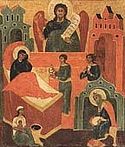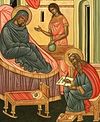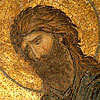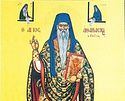 Nativity of St. John the Baptist.
Nativity of St. John the Baptist.
Martyrs Orentius, Pharnacius, Eros, Firmus, Firminus, Cyriacus, and Longinus, near Lazica (4th c.). St. Anthony, founder of Dymsk Monastery (Novgorod) (1224). Righteous Youths John and James, of Meniugi (Novgorod) (1566-1569). St. Michael, great prince of Tver (1318). St. John, monk, of Yaransk (Solovki) (1561). St. Onuphrius, founder of Katrom Monastery (Vologda) (16th c.). St. Gerasimus (Dobroserdov), bishop of Astrakhan and Enotaeva (1880).
Valaam Icon of the Most Holy Theotokos.
St. Nicetas, bishop of Remesiana (Bela Palanka) (ca. 414). St. John the Hermit, of Bohemia (904). Translation of the relics of Great-martyr John the New to Suceava, Romania (1492). St. Nicephorus (Cantacuzene), archdeacon, of Constantinople, who suffered under the Uniates in Marienburg, Galicia (1599). New Martyr Panagiotes of Caesarea, at Constantinople (1765). St. Athanasius of Paros (1813). Synaxis of the Righteous Zachariah and Elizabeth, parents of St. John the Forerunner.
Third Sunday After Pentacost. [Rom. 5:1-10; Matt. 6:22-33]
If therefore thine eye be
single[1]
thy whole body shall be full of light. But if thine eye
be evil, thy whole body shall be full of
darkness. Here the mind is called the eye,
and the entire composition of the soul is called the
body. Thus, when the mind is simple then it is light in
the soul; when the mind is evil, then it is dark in the
soul. What are a simple mind and an evil mind? A simple
mind is one which accepts the word of God as is
written, and is convinced beyond a doubt that all is
indeed as is written. It has no deceit, no wavering, or
hesitation. An evil mind is one which approaches the
word of God with slyness, artful disputing, and
questioning. It cannot directly believe, but subjects
the word of God to its sophistry. It approaches the
word not as a disciple, but as a judge and critic, to
test something stated there, and then either scoffs at
it, or says in a haughty manner, “Yes, not
bad.” Such a mind has no firm tenets, because it
clearly does not believe the word of God, and its own
rationale is always unstable—today one way,
tomorrow another. It has only wavering, confusion,
questions without answers; everything is out of place
with it, and it walks in the dark, fumbling its way. A
simple mind sees everything clearly: every thing in it
has a definite character, determined by the word of
God. That is why every thing in it has its place, and
it knows exactly how to behave with relation to
things—it walks along open, visible roads, with
complete assurance that they lead to the true goal.
[1]
In Church Slavonic, the text translates as, If thine
eye be pure.


![]() Nativity of St. John the Baptist.
Nativity of St. John the Baptist. 
























